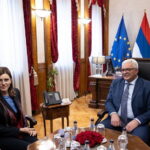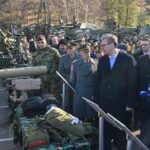- North Macedonia parliament elected a technical Prime Minister, Talat Xhaferi, an ethnic Albanian. He served as parliament speaker before resigning ahead of his election as interim PM.
Sixty-five out of 120 deputies voted for Xhaferi on January 28. Representatives from the main opposition Macedonian party VMRO-DPMNE cast no votes.
The interim government led by Xhaferi is expected to hold parliamentary elections on May 8.
- The opposition in Serbia continues a protest rally, demanding non-recognition of election results
About 2,000 people responded to a call by the opposition bloc, “Serbia Against Violence”, gathering on January 27 outside the Constitutional Court of Serbia to demand that the results of the election results be annulled amid evidence of numerous violations.
One of the rally leaders, Srdjan Milivojevic with the Democratic Party, addressing the crowd, said: “We only demand a repeat of the elections. There is no compromise. I haven’t heard any thief plead ‘I am a thief’, Milosevic didn’t do that, Vucic won’t say that either. We are here to tell them that they are thieves.”
Protesters chanted “Vucic is a thief”.
The protest then wrapped up peacefully.
- One of Hungary’s priorities during its presidency over the European Union will be to speed up the accession of the Western Balkan nations to the EU, Hungarian Foreign Minister Péter Szijártó said after meeting with the President of Republika Srpska, Milorad Dodik, in Banja Luka.
“The European Union needs fresh energy, and the Western Balkans is a region that can deliver it,” Szijártó emphasized.
“We respect Budapest’s approach to the region, and I am grateful for the clear positions on this. Hungary is a natural partner for the development of the EU relations with the Balkans, and we welcome the fact that Hungary will soon hold presidency of the European Union,” President Dodik said at press conference after meeting with Szijártó.
- NATO Secretary General Jens Stoltenberg stressed the important role of Montenegro in ensuring stability in the Western Balkans. He stated this while meeting with Prime Minister of Montenegro Milojko Spajic at the Alliance HQ on January 26.
Montenegro plays an important role in the Western Balkans, a region of strategic importance for NATO, Stoltenberg noted, emphasizing its importance as stability in the region remains fragile, he believes.
The Secretary General of the Alliance also underlined the significance of Montenegro’s contribution to NATO’s mission and emphasized that Montenegro is a “highly valued NATO ally. “You have deployed troops to our battlegroups in Bulgaria and Latvia, helping to deter Russian aggression. In Iraq, Montenegro is contributing to building more effective and inclusive security forces, as part of NATO’s training mission. Montenegro also plays an important role in the Western Balkans, a region of strategic importance to NATO,” Stoltenberg noted.
The Secretary General also thanked Montenegro for its support to Ukraine, “including through NATO’s comprehensive assistance package.” Stoltenberg added that ” NATO Allies and the European Union need to step up and provide even more funding for Ukraine at this critical time.”
- Montenegro has a population of 633,158, marking a two percent rise against 2011, according to preliminary data by MONSTAT.
The population census kicked off on December 3 and lasted through December 28, 2023.
Data on religion, language, and nationality, as well as citizenship of Montenegrin residents, have not been published because, as MONSTAT reports, it will take several months to process the data, after which a full report is expected to be released.



